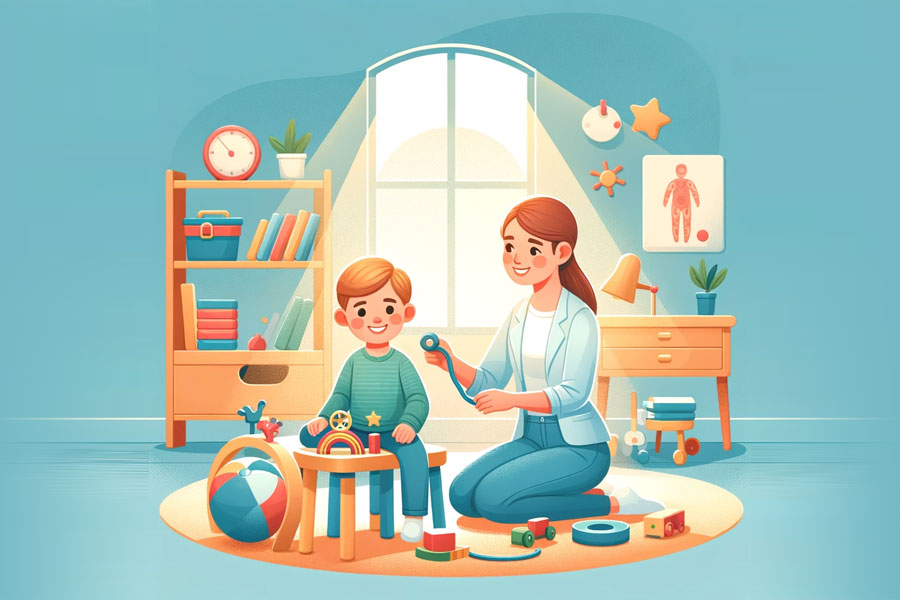
Introduction to Occupational Therapy
Occupational therapy (OT) plays a pivotal role in assisting children’s development, particularly in their early years, a crucial period for brain development. Unfortunately, some children face developmental delays, hindering their ability to mature at the same rate as their peers. This is where occupational therapy steps in as a beacon of hope and support.
Occupational therapy encompasses a series of exercises, techniques, and activities designed to foster skills necessary for daily living. It significantly helps children who struggle with routine tasks such as brushing teeth, dressing, or school-related activities like writing or using simple tools. These children often face challenges with motor responses and sensory processing, making them slower and more prone to errors than others. OT offers a progressive path for children to gradually gain independence in these activities.
When Is Occupational Therapy Needed for Children?
It’s a common question among parents whether their child requires occupational therapy. While some children might develop skills later than others, there are specific instances where OT can be highly beneficial:
- Children suffering from congenital defects
- Issues with sensory processing
- Challenges faced due to birth-related injuries
- Difficulty in learning new tasks
- Conditions like arthritis or similar musculoskeletal disorders
- Developmental disorders, including autism and behavioral issues
- Extreme burns
- Children dealing with cancer, paralysis, or other debilitating diseases
The Benefits of Occupational Therapy for Children
Introducing your child to occupational therapy can provide several benefits:
1. Mastering Daily Life Routines
Many children face difficulties in performing essential daily activities. These include brushing teeth, using the toilet, holding a pencil to write or draw, dressing independently, and buttoning shirts. These are skills that children should ideally develop on their own. Occupational therapy helps in achieving this level of independence.
2. Addressing Sensory Perception and Processing Issues
Children with sensory perception difficulties face challenges in accurately perceiving their environment. They might have trouble detecting too soft or too loud sounds, understanding touch, recognizing smells, and differentiating tastes. Such issues can lead to extreme behaviors in school and a general sense of lethargy or apathy. Occupational therapy teaches these children to regain control over their senses and assess them appropriately.
3. Enhancing Movement Opportunities for Children with Cerebral Palsy
Cerebral palsy significantly restricts physical movement, varying with the severity of the condition. Most children with this condition also suffer from muscle dystrophy, leading to limited mobility and reliance on wheelchairs. Occupational therapy plays a crucial role in developing their abilities, teaching proper use of aids, and making necessary adjustments to integrate these into their lives seamlessly.
Why Is Occupational Therapy Beneficial?
Occupational therapy is not just about improving physical abilities; it’s also about enhancing mental health and overall well-being. Children with various needs, from those with autism to those with attention difficulties, find OT to be a game-changer in their daily lives. The therapy focuses on customizing activities to each child’s unique needs, fostering a sense of achievement and independence.
Activities to Improve Attention in Children
One of the critical areas where occupational therapy shines is in improving attention in children. Through engaging and tailor-made activities, OT helps children focus better, enhancing their ability to learn and participate in school and home environments. These activities are designed not just for improvement but also to be enjoyable and motivating for the children involved.
Occupational Therapy and Behavior Management
How does occupational therapy help behavior? This is a vital question for many parents, especially those with children who have behavioral challenges. OT provides structured environments where children can learn coping mechanisms, improve their social interaction skills, and manage their emotions more effectively. These skills are crucial for their overall development and integration into society.
How Does Occupational Therapy Support Mental Health?
Occupational therapy plays a significant role in supporting children’s mental health. It helps in building self-esteem, reducing anxiety, and improving social skills, which are critical for children, especially those dealing with mental health challenges. The therapy provides a safe and structured environment where children can express themselves and learn to manage their emotions and reactions better.
Occupational Therapy for Autism
Why is occupational therapy important for children with autism? Children on the autism spectrum often face unique challenges in sensory processing, social interaction, and communication. Occupational therapy helps these children by developing their fine motor skills, improving their ability to process sensory information, and enhancing their social and communication skills. This approach is tailored to each child’s needs, ensuring they receive the most beneficial treatment to improve their daily life skills.
Developing Skills Through Occupational Therapy Activities
Occupational therapy activities are varied and tailored to each child’s specific needs and abilities. They range from basic tasks like dressing and feeding to more complex skills like writing and using technology. These activities are designed not only to improve the child’s current abilities but also to foster the development of new skills that can be used throughout their lives.
Occupational Therapy Activities to Improve Attention
Specific occupational therapy activities to improve attention include games that require focus, puzzles, and tasks that involve following directions. These activities are designed to be engaging and enjoyable, ensuring that children are motivated to participate and learn.
Role of Occupational Therapists
Occupational therapists are the cornerstone of this therapy. They assess each child’s unique needs and develop a customized plan that addresses those needs. They work closely with parents, teachers, and other professionals to ensure a holistic approach to the child’s development. Their expertise and dedication are crucial in making occupational therapy effective and beneficial for children.
Conclusion
Occupational therapy is an essential tool in helping children overcome various challenges, from developmental delays to specific conditions like autism. It provides the support and guidance needed for children to develop essential life skills, improve their mental health, and lead more independent lives. The importance of occupational therapy in a child’s development cannot be overstated, and its benefits are seen not just in childhood but throughout their lives.
Whether it’s through activities designed to improve attention, behavioral management techniques, or support for mental health, occupational therapy offers a comprehensive approach to helping children reach their full potential. It’s a journey of growth, development, and empowerment for both children and their families.
As we continue to understand and appreciate the significance of occupational therapy in children’s lives, it becomes evident that this form of therapy is not just beneficial; it’s vital for the holistic development of young individuals facing various challenges in their growth and development.


